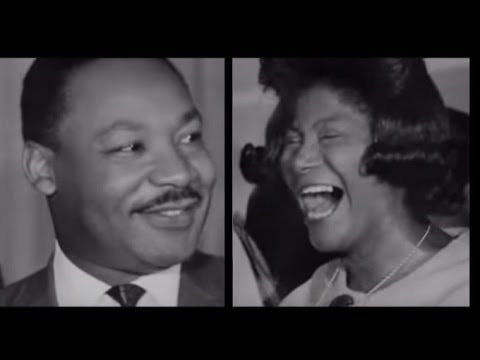The civil rights movement was driven by marches and sit-ins, lawyering and politicking, speeches and legislation. But it was also fueled by music — songs of oppression and hope, resilience and survival.
This weekend, as we celebrate the birthday of Dr. Martin Luther King Jr., we felt it would be fitting to honor the power of that music. These are melodies and lyrics that stirred the soul of a nation, referencing the ugliness of its history to suggest a new path of greater empathy and justice. Nearly 60 years later, we are reminded that this journey remains one very much in progress.
In honor of Dr. King, let us start at the 1963 March on Washington for Jobs and Freedom (the full name of the event deserves its due). Right before Dr. King delivered his “I Have A Dream” speech, the crowd was treated to another performance for the ages, by his favorite gospel singer, the peerless Mahalia Jackson. She sang a pair of hymns, including the one we are posting here: “I've Been Buked and I've Been Scorned.”
Listen to the music and the power of her voice. And look at the faces of that crowd, all ages and races, standing in rapt attention.
Jackson is also credited for inspiring what came next. As Dr. King was reading from his prepared text that day, she yelled out to him, "Tell them about the dream, Martin! Tell them about the dream!" He apparently looked at her, slid his notes off to the side, and began to speak extemporaneously. The rest, as they say, is history.
To capture this special bond between singer and preacher, we found this clip of Jackson and Dr. King at a church in Chicago. She launches into a rendition of “Joshua Fit The Battle Of Jericho”; the look on his face is priceless.
Finally, no song is more closely identified with the civil rights movement than the iconic “We Shall Overcome.” There are too many great versions to count, so here we share (not for the first time) one of our favorites. It is courtesy of the Morehouse College Glee Club.
Part of the power of this performance lies in the strength of the voices and the arrangement for a capella. But it also moves us to see new generations channel the struggles and victories of the past in order to build a brighter future.
As our nation continues to wrestle with its injustices and inequalities, and with the goal of a more perfect union remaining illusive, these powerful songs resonate once more. They are a testimony that progress is possible. And in that may we find a reason to smile.
Note: If you are not already a member of the Steady community, please consider subscribing. We always appreciate you sharing our content with others and leaving your thoughts in the comments.



Whenever I hear We Shall Overcome, I think of my grandmother and it always brings tears to my eyes.
My grandmother, Kate Muldowney, was born in 1884 the daughter of Irish immigrants. Her husband passed away in 1930. From 1930 until 1956, she maintained the family business with the help of Clifton and his lovely wife, a couple who escaped Jim Crowe in Virginia. When Clifton passed away in 1956, my grandmother wanted her family to attend the funeral and they refused. As an accommodation, my mother suggested that I accompany my grandmother. On the day of the funeral, Clifton’s son picked us up in his Chevrolet convertible. My grandmother and I were driven to the church and were seated directly behind the family. When we arrived, we entered
the church accompanied by Clifton’s son. As I looked around, I could see that Nanna Kate and I were the only light skinned people in the church. I looked at my grandmother and she stood proud and tall.
I will never forget that day as long as I live. And I will never forget my grandmother’s grace and courage to do the right thing and uphold the social teaching of the Catholic Church.
And so, I can never hear We Shall Overcome without thinking of my beloved Nanna and how she influenced my view of the world.
One of my favorite MLK quotes: "The arc of the moral universe is long, but it bends toward justice.”